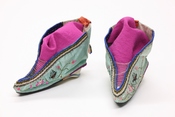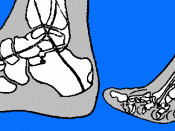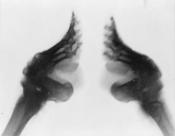China is, and always has been, a patrilineal and patriarchal society. It is well known that Chinese society emphasis the importance of the family and the hierarchy within the family. Men's superiority and women's inferiority are deeply rooted in the 2,000-year-old Chinese culture.
The view of women in china may have changed over the years but they all have lived in a male dominated world. The past has been like many cultures, in the legal and cultural suppression of women. Women were under capitalism in the traditional China. According to Claudie (1977: 5), there were mainly five types of social relations that are 'social labour, housework, children, the family, and sexuality'.
During the 18th Century, women in China continued to be subordinated and subjected to men. Their status was maintained by laws, official policies, cultural traditions, as well as philosophical concepts. Confucianism greatly influenced the role of women and the family structure in China.
Women were to follow the Confucian ideology of 'Thrice Following', which are as follows: observing filial piety in childhood, submitting to ones husband in marriage, and obeying ones son in widowhood (Kay Ann, 1983: 1; Claudie, 1977: 109; Elisabeth, 1978: 13). According to Elisabeth (1978: 12), Kay Ann (1983: 10) and Katie (1975: 10), Confucius assigned yin to female and yang to male. Yin means darkness, weak, passive, and objective whereas yang means brightness, strong, and subjective. Kay Ann also suggests that women passed through three ages in traditional China: Firstly, she was under the control of her father, then she would be subjected to her husband, and finally, she would be directed to her son. According to Confucian theory, women were inferior to nearly everyone (Richard & Stanley, 1981: 48). She was to do as her husband wishes and received little in return.
In China, many people live on the farm, and strong hands are needed in the fields. Therefore, the Chinese favor sons over daughters (Compton's Living Encyclopedia, 2000). Sons were to take care of their parents in their old age, while daughters leave their homes when they marry and became part of the husband family. Moreover, only sons would carry on the surname of the family. They would be the heir for the lineage and continuation of the family line (Francesca, 1997: 283). Thus sons have very high possession in traditional Chinese family. The parents would send their sons to obtain decent education but girls were to stay at home and do the household chores (Francesca, 1997: 8; Richard & Stanley, 1981: 58). As Francesca (1997: 37) stated the doctrine of 'In a woman stupidity is virtue'. A man could marry as many concubines as he wanted to produce more sons (Katie 1975: 11). As Chinese people said, more sons, there would have more happiness. After the parents died, the son would have the rights of property ownership and management over the land but not for daughter (Kay Ann, 1983: 9; Delia, 1975: 246).
When a baby girl was born, the family viewed her as a temporary possession. Some parents would sell the baby girls when they need the money (Delia, 1975: 244). These girls were often brought up as household servants or as prostitutes. Some baby girls were even killed because they were seen as a burden to the families. The reason for killing female babies was mainly to circumvent the burden of dowries when they were to marry (Francesca, 1997: 288). There are many poems to describe women in china. The following are one of the many that was written by Hu Shih (as cited in Francesca, 1997: 4).
When a son is born,
Let him sleep in the bed,
Clothe him with fine dress,
And give him jades to play with.
May he grow up to wear crimson
And be the lord of the clan and the tribe!
When a daughter is born,
Let her sleep on the ground,
Wrap her in common wrappings,
And give her broken tiles for her playthings.
May she have no faults, not merits of her own;
May she well attend to food and wine,
And bring no discredit to her parents!
Foot-binding, a thousand years old institution, which is seen as an elite fashion and to beautifying women, was a physical torture to women. Girls were to bind their feet since young. According to Kay Ann (1983: 16) and Elisabeth (1978: 19), foot-binding was carried out to restrain women's movement. So she would confine in the house. Women's feet were bound as children until the arch was broken and the toes permanently bent under. Even though foot-binding caused severe problems later in life, it was a sign of nobility (Dorothy 1994: 165).
When it was time for the girl to get married, her parents would seek a matchmaker to find a husband for the girl (Katie, 1975: 10). The dowries must be as much as the family could afford to show that they were wealthy enough and their daughter was being doted by them. After marriage, women must follow the 'Four virtues'. According to Hsu Kuang (1977: 9) and Dorothy Ko (1994: 145), 'Four virtues' were 'women's virtue, speech, appearance and work'. Women's virtue meant that a woman must behave in complete compliance with the 'feudal ethical code'. Women's speech meant that a woman must follow the feudal ethical code. Women's work meant that a woman must do all the household works and serve her husband and parents-in-law well. After marriage, women were supposed to produce children (especially male children). Women could gain some status in the family by giving birth to a son. (Kay Ann, 1983: 10; Elisabeth, 1978: 31). If a woman did not produce any male children, she would be a disgrace of the family and probably be thrown out of her husband's home (Katie, 1975: 11). According to Francesca (1997: 49), female who had lost her virginity before marriage was seen as polluted or impure in the traditional Chinese society. Confucius taught them to seek death rather than staying alive and be an eye sore in the society. She also stated that a girl would have no status in her home or society without marriage (1997: 77). And even after one's husband had passed away, a widow was not supposed to remarry again. Otherwise, she would be blame by the society and be seen as a not chaste woman (1997: 49).
Women were not supposed to work in the past. Otherwise, they would be discriminated and exploited by the society (Hsu Kuang, 1977: 1). Moreover, most of the women were foot-binding; they could not work because they were crippled (Francesca, 1997: 270). However, some women had to work to make ends meet. They did not get equality in the workforce but were being oppressed (Claudie, 1977: 22-24). As Mao Tse-Tung (Claudie 1977: 1; Elisabeth, 1978: 2) once said that 'women carry half of heaven on their shoulders and they must conquer it'.
In summary, women's lives in old China were very tough. They have no rights over almost everything. They were like toy to be controlled with. It is glad that women in China nowadays have earned equal rights as men and most of the old custom had been abolished. However, women are still inferior to men in education, employment, and political participation especially in rural areas. With the new technological innovations, economic growth, and social progress, hopefully, Chinese women and men become entirely equal.


